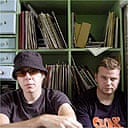With dance music-baiting becoming something of a national sport, the Chemical Brothers find themselves in an unfamiliar position. The release of a singles compilation marking their 10th anniversary is a reminder that they have been the most successful and enduring dance act to come out of Britain, and the two new tracks on the album are evidence that they are as excited as ever about the music they make.
But an image-conscious brand of rock'n'roll has taken the limelight in the last two years, and the Brothers, who look as if they could be found working in the bicycle department of a branch of Halfords, are distinctly to one side of the current vogue.
"People have taken satisfaction in knocking dance music because it's not the huge central force it once was," says Ed Simmons, who met Tom Rowlands while studying medieval history at Manchester University.
Of the two, Simmons is the one more determined to defend his territory. "But anyone who is making great electronic music is doing something just as worthy as, say, the Kings of Leon. I had a great time at Notting Hill Carnival, I've just come back from Ibiza, and watching people having fun in a club will always be a great thing. The spirit of adventure and enjoyment is still there."
"It's an unnatural way of looking at music, though," adds Rowlands, sagely. "When we started making records, there would be electronic bands smashing guitars on the front of the NME: you know, we don't need your rock music any more, we've got our shiny new synthesisers. People were asking us then: is rock music dead? Then you would go to America and you would realise how worthless that question was. I'm as excited about the new Strokes album as I am about a new dub collection, or some naughty, horrible garage track from south London. The idea that there are monolithic shifts in music isn't really true."
The spiritual home of the Chemical Brothers is somewhere in a field off the M25, at four in the morning in 1989. The record that started it all for them was The Phantom by Renegade Soundwave. "We met in 1989, and we spent that summer in fields dancing to music, when this sounded like the best record in the world for three or four months," says Simmons. "The way it was put together, and the way it could rock a crowd of people, obsessed me for years."
"It was a weird and groundbreaking record," says Rowlands. "It had Sex Pistols and Clash samples, and dub touches and African chants, but you put it on at a rave and everyone went mental. We always liked that combination of something interesting and innovative and different, and something that people can respond to in a primal way. And I certainly think that making people dance is a noble aim. It's not seen as being as worthy as making people cry, but it is."
Nobody with a passing interest in dance music can avoid the shadow of Kraftwerk. Rowlands and Simmons have both been enjoying Kraftwerk's new album, which is dominated by remixes of Tour de France. "It has a good, aerodynamic sound," says Simmons, while Rowlands claims that "I was sceptical about it, and then I started watching the Tour de France on Eurosport every day and it all came together. But Computer World is my favourite Kraftwerk record because it doesn't sound like anything else, and it's so machine-made that it actually becomes really emotive. It's hard to fall in love with a computer, but they managed it."
The Chemical Brothers have acknowledged debts both to the records they have sampled and the people who started DJ culture in the first place, like Kool Herc, the New York DJ credited as a pioneer of hip-hop. "We loved the idea of Herc playing Walt Disney records on a street corner in the Bronx and knowing how to make people dance to them," says Rowlands. "We played with him in New York, so we repaid the debt and flew him over to DJ at one of our shows at Brixton Academy. It went great until he told everyone to put their hands together for God, because he's a Christian now. It was a case of wrong place, wrong time."
Hip-hop records also offered a musical history lesson through their use of samples. "There was that golden age of hip-hop in the early 90s when the Jungle Brothers made Straight Out the Jungle and De La Soul made Three Feet High and Rising," says Simmons. "They were an introduction to music. How else would you hear someone like the Jimmy Castor Bunch, or the Turtles? Those records were made by people who showed a great love of music."
Today's retrospective climate hasn't encouraged much innovation, but Rowlands mentions a band called the Bays, an improvisational, jazz-tinged drum'n'bass outfit who only play live and make it up as they go along. The Flaming Lips and Mercury Rev remain favourites. "Both of those bands are full of ideas, and they're interested in new adventures," says Rowlands. "There's a real exuberance of possibility there, an explosion of madness."
Both agree on a favourite album that is a long way from dance music's hedonistic charms: Blonde on Blonde by Bob Dylan. "We both love Dylan, who we always try and go and see whenever we can," says Rowlands. "He's on a never-ending tour, isn't he? I suppose if he stopped he would keel over. And we always used to listen to Blonde on Blonde when we were in the car on our way to gigs. It got us in the right mood, somehow."
